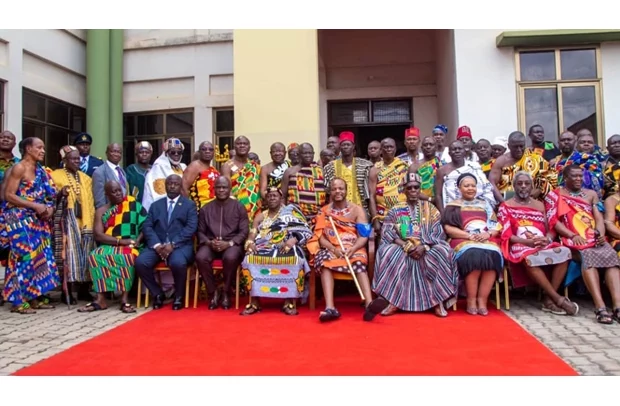King Mswati III with members of the National House of Chiefs
THE KING of Eswatini, His Majesty Mswati III, has called for more recognition to be given to women in both local government and traditional institutions to help accelerate national development across the African continent.
According to him, women since time immemorial, have been playing crucial roles in the development of communities, therefore the strong need for more recognition to be given to women to sustain their key roles in national growth.
“We should take note of the important roles that women play in the development of our communities and countries, and also offer to them the proper support to deliver for us always,” the visiting monarch remarked.
King Mswati III, who is on a four-day working visit to the country, made the remarks while addressing the National House of Chiefs at Manhyia in Kumasi, the Ashanti Regional capital on Wednesday.
Continuing, the revered monarch stated that the roles of queenmothers in African traditional societies clearly buttress his claim that women should not be sidelined in the developmental aspirations of the African continent.
Using his country as a case study, the king stated emphatically that Eswatini people recognise and give the needed respect and recognition to women as key players in the development of the country.
He also recounted the significant roles that traditional leaders played during the colonial era to help African countries to get their liberation, stressing that traditional leaders are still useful and important for national growth in this era.
King Mswati III particularly charged chiefs in Africa to work assiduously to ensure the “preservation of our culture and language”, saying, “We have a duty to guide and protect the traditions because they define the people that we are.”
Globalisation and western democratic models, he opined, seemed to diminish the roles of traditional leaders nowadays, but he was quick to charge chiefs to continue to take their rightful place in shaping the future of Africa.
“We must adopt innovate policies and take our rightful roles to shape Africa’s future. We should not allow ourselves to be sidelined,” King Mswati III admonished the chiefs, drawing spontaneous applause from his audience.
According to him, he is a firm believer that modern system of government and traditional authorities could still team up and work closely together to push the developmental agenda of Africa, as they did perfectly in the past.
“Transatlantic Slave Trade and similar tragic incidents remain painful chapters in our collective memories. Yet we draw strength from our traditional leaders who alongside national heroes stood firm to help attain freedom for Africa,” he stated.
He saluted the revered Dr. Kwame Nkrumah, Ghana’s first president, who collaborated with chiefs to reclaim Ghana’s sovereignty, stressing, “Traditional authority and modern governance are not in conflict and can complement one another.”
King Mswati III also called for more collaboration between sister African countries, saying, “Let’s learn from one another and ensure that our traditions evolve to show who we are. We should visit each other’s country going forward.”
“Our aspirations extend beyond cultural exchange as we have immense potential for collaboration in science, technology, education, tourism, trade and education,” he said, noting that Ghana and Eswatini should work closely together.
King Mswati III also commended the people of Asante Kingdom, especially Otumfuo Osei Tutu II, for preserving their rich culture, which dates to about four centuries, saying that “the vibrant culture of Asante is marvelous.”
According to him, the traditions and culture of Asanteman that he had witnessed “makes me and my delegation feel truly at home. This exemplifies the spirit of Africa, and we should preserve our culture.”
The President of the National House of Chiefs, Nana Ogyeahoho II, in his welcome address, stated categorically that Ghana and Eswatini should learn from each other to help advance the development of the two countries.
FROM I.F. Joe Awuah, Kumasi


